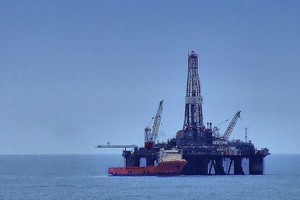Drilling Ourselves Into a Hole?
High gas prices are spurring support for offshore drilling, which experts say won’t alleviate the pain at the pump.
Jul 31, 202041.2K Shares643.8K Views
Government data says that opening U.S. coasts to offshore oil drilling won’t lower gas prices. The Bush administration’s own Energy Information Admin. projectsthat offshore drilling “would not have a significant impact on domestic crude oil and natural gas production or prices before 2030.”
Even by 2030, says EIA energy expert Phyllis Martin, Americans won’t see a change at the pump. “We’re talking about pennies,” she said. “Looking at the amount of additional [oil] production, it’s a drop in the bucket.”
Illustration by:Matt Mahurin
Yet, public support for offshore drilling is way up. Polls bythe Pew Research Center, Gallup, The Wall Street Journal/NBC, the Public Policy Institute of California and Rasmussen Reports all show that a significant majority of Americans now support opening coastal areas for drilling. Even in states like Florida and California, that historically have strongly opposed drilling, people are changing their minds.
Pollsters say high gas prices are the most likely cause of this rapid change in public opinion. But if energy experts are right, drilling won’t affect gas prices. So, why does the public seem to have it so wrong?
“A lot of people don’t realize that it would take time to develop this resource,” said Martin. “The key issue here is timing. It’s not that opening the [Outer Continental Shelf] won’t make an impact. It’s just that it won’t make an impact tomorrow.”
Once the Atlantic coastline, the Pacific coastline and the Gulf are opened for drilling, she says, infrastructure has to be put in place, pipelines built and leasing programs created and implemented. After all that, the amount of additional oil production will be 240,000 barrels per day, the EIA projects. That’s less than 1 percent of total consumption.
“I think some people have the idea that if [the Outer Continental Shelf] opened up tomorrow; there will be an oil company drilling the day after tomorrow,” Martin said. “It just doesn’t happen that way. It takes time to do all of this.”
Michael , associate director for the Pew Research Center for People and the Press says more and more Americans are starting to support drilling because they’re looking for anyanswer to their energy woes. “People are hopeful that anything might help,” he said. “One thing they’re telling us is that they want something done about it. If we ask, should the government do this? The instinct is to say yes. They may be skeptical about it making a difference, but they want something done.”
For the first time in roughly eight years, Bimock says, Pew is finding public opinion tipping toward energy exploration and away from energy conservation. “It’s a subtle shift,” he said, “but it is a significant shift in the public’s mood.”
But that opinion is being influenced by what’s on the political agenda today, Bimock says. “I don’t think the public came up with the idea of offshore drilling as a solution,” he said. “The public’s looking for political leaders to provide answers and this is one that’s certainly been the focus of a lot of discussion — particularly coming from the White House and the McCain campaign.”
The issue of offshore drilling is still highly contentious in areas like Florida and California. That’s because several industries taking hits from high fuel prices could also take economic hits from the environmental impacts of drilling.
Bob Holston is the owner of Dive Key West, the largest dive center in Key West, Fla. Lately, his customers have been talking a lot about offshore drilling.
“Some feel that drilling should be allowed,” Holston said. “The overwhelming majority, though, says no, it should not be allowed…Whether [drilling] is going to be a realistic problem or not, the perceived problem could drastically impact tourism. People would think, okay, there’s oil drilling and we’re not really comfortable with that.”
Holston is also the president of the Keys Assn. of Dive Operators and he sits on the board of trustees for the National Marine Sanctuary Foundation. While the technology used for drilling may be safe, he says, it only takes one accident for an oil spill to pollute the waters, kill wildlife, create major cleanup costs and harm the tourism industry.
But oil spills aren’t the only things Holston and other coastal business owners worry about. There’s also a great deal of secondary pollution that comes with developing oil resources. “What a lot of people don’t take into account is the support facilities moving the product from the well to the offshore refinery,” he said. “There are tankers and supply boats moving back and forth. There’s a lot more traffic, and a lot of energy being expended.”
In addition, there is always the chance of error or violations, Holston pointed out. Just this summer, a foreign-flag oil tanker owned by the Overseas Shipholding Group was foundto be illegally discharging oil from the vessel into the Gulf of Mexico and falsifying oil record books. The U.S. Dept. of Justice brought criminal charges against the OSG and the tanker’s chief engineer.
Holston says that any industrial pollution adds unnecessary stress to the only coral reef in the continental U.S. “We have a living coral reef,” he said, “and if it was to die, it’s not going to come back. It’s not something we can replant and grow.”
But not everyone is certain that offshore drilling will have negative consequences. “I’m not sure how it’s going to impact [the tourism industry],” says Andy Newman, senior vice president of NewmanPR, a tourism public relations firm based in Miami. NewmanPR works with companies in the travel, cruise and maritime industries, and one of its biggest clients is the Florida Keys Tourism Council.
“There are certainly benefits and there are liabilities,” Newman said. “It’s an interesting balance, because obviously you have to have a pristine, clean environment — that’s very, very important to the picture of the coastal areas, such as the Keys. On the other hand, people need to be able to have affordably priced fuels to get to these destinations, and they have to have more disposable income.”
Even the state of Florida’s Commission on Tourism is of two minds on the issue. Visit Florida, the tourism commission’s operating company, says it has yet to develop an opinion on offshore drilling, though its partners have a range of views.
“We’ve been hearing from various partners,” said Visit Florida spokeswoman Dia Kuykendall. “Some who are saying yes, we do believe oil drilling would help — that $5-a-gallon gas is very scary. And some saying things like, ‘I don’t want to see dead birds on the beaches,’ that ‘people won’t come to the beaches.’”
This has become such a hot issue among tourism businesses that next month, the Florida Assn. of Convention and Visitors Bureaus is holding an “Offshore Oil Drilling Summit.” Kuykendall says Visit Florida will be able to form a clear position on the topic after that conference takes place.
Florida residents overall, though, are warming up to drilling. Rasmussen Reports finds that 61 percent of Florida voters believe offshore drilling will lower gas prices, while 34 percent don’t.
On the West Coast, support for drilling is also on the rise. Though California Gov. Arnold Schwarzenegger continues to blast the notion that offshore drilling will lower gas prices, residents of the Golden State aren’t entirely convinced. The Public Policy Institute of California released a polllast month finding that 51 percent of Californians support drilling, jumping from 41 percent in 2007. This is a slight majority, but a majority nonetheless.
Conservationists in the state say the risks of drilling heavily outweigh the benefits — both from environmental and economic standpoints. The Surfrider Foundation, a non-profit, non-partisan environmental organization dedicated to protecting the world’s waves and beaches, is trying to remind Californians about the Santa Barbara oil spill of 1969, in which a Union Oil Company accident spilled of 200,000 gallons of crude oil.
Surfrider Foundation spokesman Matt McClain says even relatively minor accidents can harm the coastal economy. In July 1999, for example, a sewage spill shut down Huntington Beach for seven weeks. “All those businesses in Huntington Beach lost tens of millions of dollars,” said McClain. “It was a big wake-up call. Think about that on a statewide level.”
McClain says he understands why so many Californians — and Americans — have changed their minds on offshore drilling. “Unfortunately, people are largely reactive,” he said. “When they feel this kind of financial pinch…people really will gravitate toward any kind of answers floated out there, especially ones that appear to be quick fixes.”
McClain maintains that drilling won’t lower the price of gas, and that it’s the responsibility of elected officials to make that clear. The reason they’re not doing so, he says, is because they’re too scared.
Political rhetoric about offshore drilling is fueling the public’s support, says McClain, but in turn, public support is fueling political rhetoric.
“There’s an old adage: When you find yourself in a hole, quit digging,” he says. “I think that’s where we are right now. We’re in a hole and people can’t really see their way out.”

Rhyley Carney
Reviewer
Latest Articles
Popular Articles

